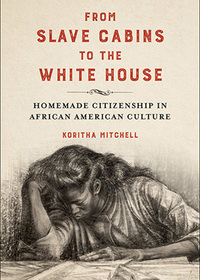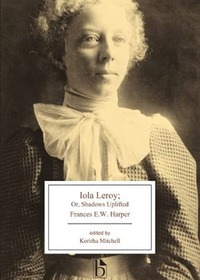
- Ohio State University
- Associate Professor
- Residential Fellow (2016-2017)
- “From Slave Cabins to the White House: Homemade Citizenship in African American Culture"
Koritha Mitchell is Associate Professor of English at Ohio State University. She specializes in African American literature, racial violence throughout U.S. literature and contemporary culture, and black drama and performance. She examines how texts, both written and performed, have helped terrorized families and communities survive and thrive.
Professor Mitchell’s study Living with Lynching: African American Lynching Plays, Performance, and Citizenship, 1890-1930 (2011) won book awards from the American Theatre and Drama Society and from the Society for the Study of American Women Writers. Mitchell’s scholarly articles include “James Baldwin, Performance Theorist, Sings the Blues for Mister Charlie” in American Quarterly, and “Love in Action: Noting Similarities Between Lynching Then and Anti-LGBT Violence Now” in Callaloo. She has also published articles in edited volumes such as Gender and Lynching (Palgrave Macmillan) and Black Performance Theory (Duke) as well as reviews in American Literature, Theatre Journal, and the Journal of American History. Mitchell is also editor of a scholarly teaching edition of Frances E. W. Harper's 1892 novel Iola Leroy (Broadview, 2018).
Professor Mitchell values reaching audiences outside of academia, and as a black feminist who understands intersectionality, she has become increasingly committed to LGBTQ+ rights. Her public scholarship has found audiences on radio, television, and online publications, including The Feminist Wire and Feministing. In 2012, she completed the Progressive Women’s Voices media training, given by the Women’s Media Center.
In March 2014, Professor Mitchell lectured at the Library of Congress and was presented with a Certificate of Congressional Recognition. Her research has been supported by fellowships from the Ford Foundation and the American Association of University Women (AAUW).
http://www.korithamitchell.com/
Publications
-
From Slave Cabins to the White House: Homemade Citizenship in African American Culture
University of Illinois Press, 2020

Koritha Mitchell analyzes canonical texts by and about African American women to lay bare the hostility these women face as they invest in traditional domesticity. Instead of the respectability and safety granted white homemakers, black women endure pejorative labels, racist governmental policies, attacks on their citizenship, and aggression meant to keep them in “their place.”
Tracing how African Americans define and redefine success in a nation determined to deprive them of it, Mitchell plumbs the works of Frances Harper, Zora Neale Hurston, Lorraine Hansberry, Toni Morrison, Michelle Obama, and others. These artists honor black homes from slavery and post-emancipation through the Civil Rights era to “post-racial” America. Mitchell follows black families asserting their citizenship in domestic settings while the larger society and culture marginalize and attack them, not because they are deviants or failures but because they meet American standards.
Powerful and provocative, From Slave Cabins to the White House illuminates the links between African American women’s homemaking and citizenship in history and across literature.
-
Iola Leroy; Or, Shadows Uplifted
Broadview Press, 2018

Frances Harper’s fourth novel follows the life of the beautiful, light-skinned Iola Leroy to tell the story of black families in slavery, during the Civil War, and after Emancipation. Iola Leroy adopts and adapts three genres that commanded significant audiences in the nineteenth century: the sentimental romance, the slave narrative, and plantation fiction. Written by the foremost black woman activist of the nineteenth century, the novel sheds light on the movements for abolition, public education, and voting rights through a compelling narrative.
This edition engages the latest research on Harper’s life and work and offers ways to teach these major moments in United States history by centering the experiences of African Americans. The appendices provide primary documents that help readers do what they are seldom encouraged to do: consider the experiences and perspectives of people who are not white. The Introduction traces Harper’s biography and the changing critical perspectives on the novel.